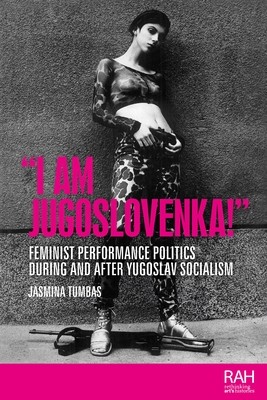
- We will send in 10–14 business days.
- Author: Jasmina Tumbas
- Publisher: Manchester University Press
- ISBN-10: 1526169045
- ISBN-13: 9781526169044
- Format: 15.5 x 23.1 x 2.3 cm, minkšti viršeliai
- Language: English
- SAVE -10% with code: EXTRA
Reviews
Description
This book reveals how feminist performance politics in art and culture were central to socialist Yugoslavia and traces a feminist legacy through the contemporary, post-socialist era. Using the term "Jugoslovenka" to encompass multiple generations of women who lived under or were born during Yugoslav socialism, it bridges decades of nation-building and violent rupture. Presenting analyses of well-known feminist artists like Sanja Ivekovic alongside controversial figures such as Marina Abramovic and Vlasta Delimar, and highlighting the feminist legacies of superstar music icons Lepa Brena and Esma Redzepova alongside contemporary artists such as Tanja Ostojic and Selma Selman, the book offers an essential insight into Yugoslav feminist performance politics. Ultimately, "I am Jugoslovenka!" introduces a starkly divergent narrative of socialism, one that reveals a vibrant Yugoslav feminist cultural production centered on questions of gender and sexuality-political commitments that shaped feminist, lesbian, and anti-nationalist movements from the 1980s to today.
EXTRA 10 % discount with code: EXTRA
The promotion ends in 21d.17:17:26
The discount code is valid when purchasing from 10 €. Discounts do not stack.
- Author: Jasmina Tumbas
- Publisher: Manchester University Press
- ISBN-10: 1526169045
- ISBN-13: 9781526169044
- Format: 15.5 x 23.1 x 2.3 cm, minkšti viršeliai
- Language: English English
This book reveals how feminist performance politics in art and culture were central to socialist Yugoslavia and traces a feminist legacy through the contemporary, post-socialist era. Using the term "Jugoslovenka" to encompass multiple generations of women who lived under or were born during Yugoslav socialism, it bridges decades of nation-building and violent rupture. Presenting analyses of well-known feminist artists like Sanja Ivekovic alongside controversial figures such as Marina Abramovic and Vlasta Delimar, and highlighting the feminist legacies of superstar music icons Lepa Brena and Esma Redzepova alongside contemporary artists such as Tanja Ostojic and Selma Selman, the book offers an essential insight into Yugoslav feminist performance politics. Ultimately, "I am Jugoslovenka!" introduces a starkly divergent narrative of socialism, one that reveals a vibrant Yugoslav feminist cultural production centered on questions of gender and sexuality-political commitments that shaped feminist, lesbian, and anti-nationalist movements from the 1980s to today.


Reviews